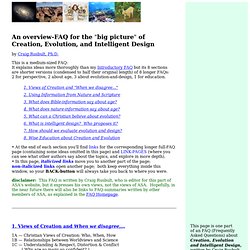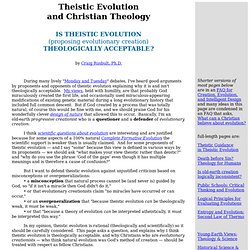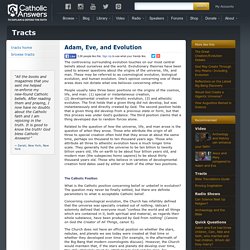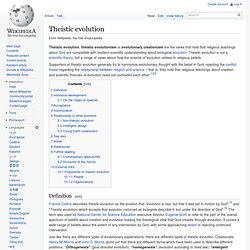

An Overview-FAQ for Creation, Evolution, and Intelligent Design. 1.

Views of Creation and When we disagree,... 1A — Christian Views of Creation: Who, When, How 1B — Relationships between Worldviews and Science 1C — Understanding & Respect, Distortion & Conflict ( Why are so many so confident? ) 1D — ASA's Views of Creation, Evolution, and Design 1A. Christian views of creation — who, when, and how? In addition, these monotheistic views are challenged by those (including atheists, deists, polytheists, and pantheists) who propose other views, and by agnostics who say "I don't know" or "we cannot know.
" 1B. When we study origins, for example, An atheist or deist or rigid agnostic has no scientific freedom, since only one conclusion — a natural Total Evolution of Everything, without God — is acceptable. 1C. In this educational website — which has been developed with the goal of promoting Accurate Understanding and Respectful Attitudes — you'll find coherent overviews (for a wide range of views) and links (so you can explore in more depth). 1D. 2. 2B. 2C.
Theistic Evolution - Is it Christian? (evolution & theology) During many lively "Monday and Tuesday" debates, I've heard good arguments by proponents and opponents of theistic evolution explaining why it is and isn't theologically acceptable.

My views, held with humility, are that probably God miraculously created the first life, and occasionally used miraculous-appearing modifications of existing genetic material during a long evolutionary history that included full common descent. But if God created by a process that was totally natural, of course this would be fine with me, and we should praise God for his wonderfully clever design of nature that allowed this to occur.
Basically, I'm an old-earth progressive creationist who is a questioner and a defender of evolutionary creation: I think scientific questions about evolution are interesting and are justified because for some aspects of a 100% natural Complete Formative Evolution the scientific support is weaker than is usually claimed. What is Theistic Evolution (Evolutionary Creation)? Adam, Eve, and Evolution. The controversy surrounding evolution touches on our most central beliefs about ourselves and the world.

Evolutionary theories have been used to answer questions about the origins of the universe, life, and man. These may be referred to as cosmological evolution, biological evolution, and human evolution. One’s opinion concerning one of these areas does not dictate what one believes concerning others. People usually take three basic positions on the origins of the cosmos, life, and man: (1) special or instantaneous creation, (2) developmental creation or theistic evolution, (3) and atheistic evolution. The first holds that a given thing did not develop, but was instantaneously and directly created by God. Related to the question of how the universe, life, and man arose is the question of when they arose. The Catholic Position What is the Catholic position concerning belief or unbelief in evolution? Concerning human evolution, the Church has a more definite teaching. The Time Question. Theistic Evolution. Theistic Evolution - Perspectives.
ALL VIEWPOINTS: One Site. All Sides. BioLogos. Theistic evolution. Theistic evolution, theistic evolutionism or evolutionary creationism are the views that hold that religious teachings about God are compatible with modern scientific understanding about biological evolution.

Theistic evolution is not a scientific theory, but a range of views about how the science of evolution relates to religious beliefs. Supporters of theistic evolution generally try to harmonize evolutionary thought with the belief in God, rejecting the conflict thesis regarding the relationship between religion and science – that is, they hold that religious teachings about creation and scientific theories of evolution need not contradict each other.[1][2] Definition[edit] Just like there are different types of evolutionary explanations, there are different types of theistic evolution. Creationists Henry M. Regarding the embracing of Darwinian evolution, historian Ronald Numbers describes the position of the late 19th century geologist George Frederick Wright as "Christian Darwinism.